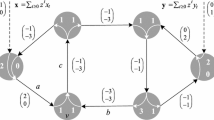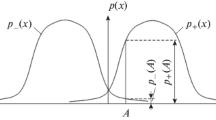Abstract
A novel Joint Source and Channel Decoding (JSCD) scheme for Variable Length Codes (VLCs) concatenated with turbo codes utilizing a new super-trellis decoding algorithm is presented in this letter. The basic idea of our decoding algorithm is that source a priori information with the form of bit transition probabilities corresponding to the VLC tree can be derived directly from sub-state transitions in new composite-state represented super-trellis. A Maximum Likelihood (ML) decoding algorithm for VLC sequence estimations based on the proposed super-trellis is also described. Simulation results show that the new iterative decoding scheme can obtain obvious encoding gain especially for Reversible Variable Length Codes (RVLCs), when compared with the classical separated turbo decoding and the previous joint decoding not considering source statistical characteristics.
Similar content being viewed by others
References
Y. Takishima, M. Wada, H. Murakami. Reversible variable length codes. IEEE Trans. on Communications, 43(1995)2/3/4, 158–162.
C. Berrou, A. Glavieux. Near optimal error correcting coding and decoding: Turbo codes. IEEE Trans. on Communications, 44(1996)10, 1261–1271.
K. Lavovic, J. Villasenor. Combing variable length codes and turbo codes. In Proceeding of IEEE Vehicular Technology Conference, Birmingham, AL, USA, 2002, 1719–1723.
M. Jeanne, J. C. Carlach, P. Siohan. Joint source-channel decoding of variable length codes for convolutional codes and turbo codes. IEEE Trans. on Communications, 53(2005)1, 10–15.
Z. Peng, Y. F. Huang, D. J. Costello. Turbo codes for image transmission-A joint channel and source decoding approach. IEEE Journal on Selected Areas in Communications, 18(2000)6, 868–879.
X. Jaspar, L. Vandendorpe. New iterative decoding of variable length codes with turbo codes. In Proceeding of IEEE International Conference on Communications, Paris, France, Jun 2004, vol.5, 2606–2610.
A. J. Viterbi. Error bounds for convolutional codes and an asymptotically optimum decoding algorithm. IEEE Trans. on Information Theory, IT-13(1967)2, 260–269.
R. Bauer, J. Hagenauer. On variable length codes for iterative source/channel decoding. In Proceeding of Data Compression Conference, Snowbird, UT, Mar. 2001, 273–282.
P. Roberson, E. Villebrun, P. Hoeher. A comparison of optimal and sub-optimal MAP decoding algorithms operating in the log domain. In Proceeding of IEEE International Conference on Communications, Seattle, WA, Jun. 1995, 1009–1013.
T. Okuda, E. Tanaka, T. Kasai. A method for the correction of garbled words based on the Levenshtein metric. IEEE Trans. on Computers, C-25(1976)2, 172–176.
Author information
Authors and Affiliations
Corresponding author
Additional information
Supported by the National Natural Science Foundation of China (No.90304003, No.60573112, No.60272056) and the Foundation Project of China (No.A1320061262).
About this article
Cite this article
Liu, J., Tu, G. & Wu, W. New iterative super-trellis decoding with source a priori information for VLCs with turbo codes. J. of Electron.(China) 24, 122–127 (2007). https://doi.org/10.1007/s11767-006-0075-8
Received:
Revised:
Published:
Issue Date:
DOI: https://doi.org/10.1007/s11767-006-0075-8




